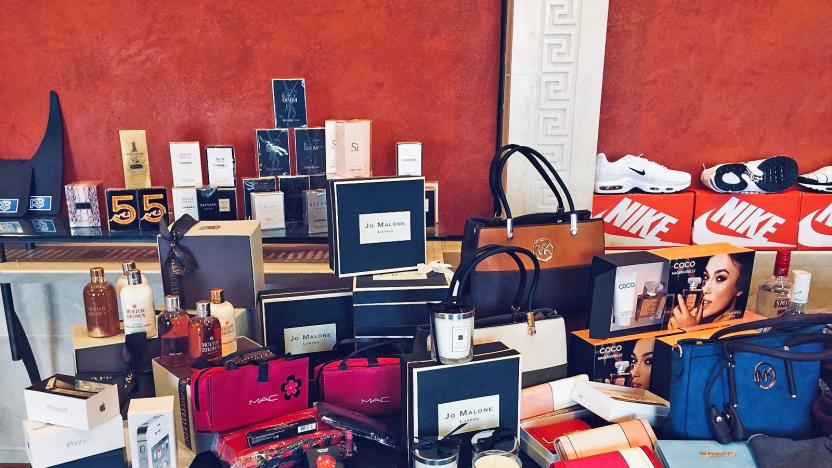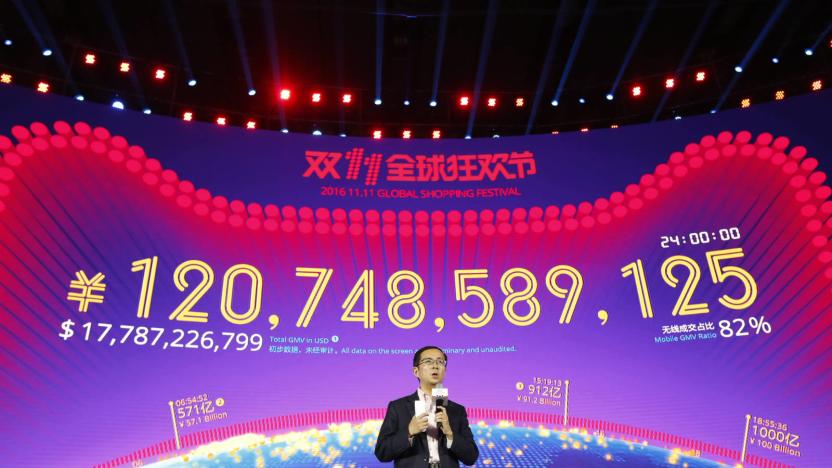counterfeitgoods
Latest

The Decode app spots fakes with NFC
The global trade of counterfeit goods reportedly rakes in half a trillion dollars per year, which isn't good for anyone. (Except for the counterfeiters themselves, I suppose.) As the fakes industry continues to grow, brands are looking to technologies like RFID (radio-frequency identification) and NFC (near-field communication) to help authenticate their products. This is where Blue Bite, a startup based out of New York City, hopes to come in. It has developed a system that relies on an iOS app, called Decode, that can tell consumers if an item is real by simply tapping their phone on it.

Amazon needs to get a handle on its counterfeit problem
Chances are you wouldn't suspect that whatever you're buying from Amazon, whether it be clothing, sunglasses or a handbag, is fake. And, for the most part, that tends to true. But that doesn't mean you should trust that every product is legit. In fact, right now if you search for "Yeezys," a highly coveted pair of Adidas shoes, you'll get more than a thousand results that are clearly fake. Two dead giveaways are design flaws and an unlikely low price -- trust me, Adidas doesn't sell them for $20. The worst part is that some of them bear the seemingly trustworthy Fulfilled by Amazon (FBA) label. But all that really means is that the company is acting as the middleman between you and the actual seller.

US continues to blacklist China’s eBay over counterfeit goods
Chinese e-commerce behemoth Alibaba's counterfeit goods problem refuses to go away. Despite noting improvements on takedown efforts, the Office of the US Trade Representative has again blacklisted Alibaba's eBay-like Taobao shopping site.

Google took down nearly 2 billion 'bad ads' in 2016
Sketchy advertisers are all over the internet, and Google is doing everything it can to stop them from scamming users. According to a recent report on the matter, the search giant removed 1.7 billion ads from its advertising platform in 2016, more than double the amount compared to the year prior. The online housekeeping included 68 million ads for illegal pharmaceutical products, 80 million for content that misled and deceived consumers, as well as 112 million others that used trick-to-click methods.

Why do Instagram and Twitter want me to buy fake Yeezys?
It's not rare for me to come across ads for counterfeit goods, particularly as I'm browsing Instagram or Twitter. And although I don't have a Facebook account, I live with someone who does and know that's an issue there as well. Targeted advertising, the kind that knows exactly what brand of sneakers and streetwear I'm into, is the least of my worries here. My problem is the fact that Twitter and Facebook (which owns Instagram) are approving sponsored posts from retailers selling counterfeits. I know better, but there are many who may fall victim to these sorts of scams.

Alibaba founder says fake goods have 'no place' on his site
Alibaba founder Jack Ma has written an editorial for the Wall Street Journal, restating his stance on pirated goods. Last week, while speaking at an investor conference, the WSJ quoted Ma as saying that counterfeit products are "of better quality and better price than the real names." However, the chairman has now taken to the paper to say that his statement was taken out of context, and that hooky goods have "no place on Alibaba." Indeed, Ma says that his company has "zero tolerance" for "those who rip off other people's intellectual property," adding that copycat goods is "akin to thievery."

Department of Justice plans to crack down on counterfeits sold online
These days, people are resorting to the internet for most of their shopping. Who can blame them; the experience is far more convenient, and often cheaper, than going to traditional brick-and-mortar retail stores. One of the problems with this, however, is how easy it is to find and buy counterfeit goods online, and the US Department of Justice wants to put an end to that. Attorney General Loretta E. Lynch has announced a plan to fight intellectual property crimes in the country, which includes a grant funding of 3.2 million dollars for local and state law enforcement agencies. The idea behind the strategy, led by the FBI, is to work with third-party marketplaces (such as eBay or Amazon) to make sure they have "the right analytical tools and techniques to combat intellectual property concerns on their websites."

Facebook, Google, Twitter spearhead Ads Integrity Alliance to thwart villainous ads
Online heavy-hitters Google, Facebook, Twitter, AOL (Engadget's parent company) and the Interactive Advertising Bureau have have struck an alliance aimed at ridding nasty advertising "from all corners of the web." Stemming from the existing StopBadware group that began in 2006, the group will develop policies, build a platform for identifying scofflaws and share trends with government and law enforcement. For its part, Google curbed 130 million ads promoting counterfeit articles, malware and worse in 2011, but said baddies would normally move their shady businesses to another corner of the internet. Thus, the aim of this new league is to aid players across the web with its super resources in a bid to stop the knavery, no matter where it tries to hide.



